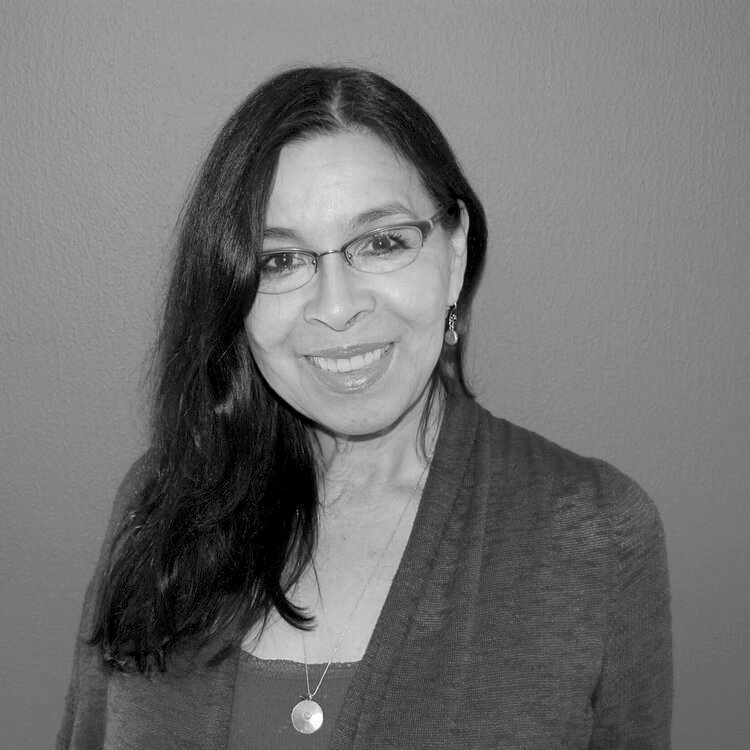Alone in Court: The U.S. Government’s Crackdown on Unaccompanied Migrant Kids
Illustration by Nacho García/Puente News Collaborative
Funding cuts, raids, and Kafkaesque courtrooms leave thousands of children defenseless. Advocates say it’s by design.
Editor’s note: This story was co-published with Puente News Collaborative in partnership with palabra and the Craig Newmark Graduate School of Journalism at the City University of New York (CUNY). Puente News Collaborative is a bilingual nonprofit newsroom, convener, and funder dedicated to high-quality, fact-based news and information from the U.S.-Mexico border.
Immigrant children who crossed the border without a parent or guardian are increasingly in the crosshairs of the Trump administration. That has meant children facing immigration judges without lawyers, and stricter screening processes for releases from shelter custody that have prolonged stays to more than five months.
Adding to tensions are increasing arrests outside immigration courtrooms and raids that could sweep up adult relatives and other hurdles. The chaos for the children and teenagers can be seen in the nation’s immigration courts in such cities as New York, El Paso, and Phoenix.
"You are here because the United States government believes that you should be removed from the United States,” said Judge Ubaid ul-Haq to a girl from the Dominican Republic who watched him via video from a shelter. “It is my job to determine whether you can be removed from the United States.”
‘Let’s all agree that children should be off limits.’
The judge, sitting in a courtroom in Manhattan last May, was precise. But the teen girl looked frustrated, as a court interpreter translated to Spanish. The minor’s identity is being withheld because of sensitivities in the case.
“For an adult, it’s almost impossible to navigate immigration court,” said Michelle Ortiz, the director of U.S. legal services at the nonprofit International Rescue Committee (IRC). “Imagine a 12-year-old, 4-year-old, a 17-year-old. It’s impossible to present a case without a lawyer.”
The tougher policy changes are adding to the minors’ trauma, advocates say.
Regardless of one’s politics, said Tatine Darker, an immigration attorney with Church World Services in New York, “Let’s all agree that children should be off limits.”
About 26,000 minors saw funding for lawyers yanked in late March, setting up a legal battle over a landmark anti-trafficking law that has led to chaos. The move slashed the budget of about 100 nonprofits across the nation that helped provide direct legal representation for immigrant minors. For the minors, all under the age of 18, that meant making decisions alone about their defense.
In late April, U.S. District Judge Araceli Martínez-Olguín issued a preliminary injunction so funding would again flow for legal assistance. The judge noted some nonprofits had already issued layoff notices. Citing a friend-of-the-court brief, the judge said children without counsel faced “greater risk of exploitation and human trafficking.”
In mid-May, an appellate court rejected the Trump administration’s bid to pause the lower court ruling.
A week later, a spokesperson for the Office of Refugee Resettlement (ORR) said, “The government is in full compliance with the court’s order.” The spokesperson for the agency that oversees shelters within the Department of Health and Human Services (HHS) declined further comment, citing ongoing litigation.
Hurdles
The funding disruption left many nonprofits scrambling. They’re also assisting immigrant families with the tougher screening procedures and “wellness checks” or “welfare checks” by Department of Homeland Security officials at the homes and schools of unaccompanied minors who have been released to sponsors. Increasing arrests outside immigration courtrooms, government calls to self-deport, and raids throughout the nation add to the stress among children who fear no one will care for them if their sponsor, usually a relative, is detained and deported.
Inside a Dallas immigration courtroom earlier this month, an attorney said his four-year-old client couldn’t make the hearing because his parent was detained by immigration agents. Caseworkers for the boy appeared before Judge Charissa Dvorak to back the story. “I will waive the presence of the child,” the judge said.
In a Phoenix immigration court lobby, flyers in red, white, and blue encourage immigrants to self-deport, listing benefits and consequences. They carry the Department of Justice logo. “Self-deportation is safe. Leave on your own terms by picking your departure flight.” The consequences: “Possible imprisonment…”
Self-deport flyer found in immigration court lobbies around the country. Photo by Nicol León/Puente News Collaborative
In El Paso, Texas, at the Catholic nonprofit Estrella del Paso, which provides legal services to immigrants, executive director Melissa M. López tries to figure out how to keep her legal staff together. Her biggest worries are the children.
“Now, they find themselves without the people who used to answer their questions,” López said. “And they feel alone.”
Stricter screening sent the minors’ shelter stays soaring. The average length of care per month jumped from roughly two months in December 2024 to more than five months by May 2025, according to HHS data. Advocates fear that the mental health of minors will suffer from prolonged stays in government-funded shelters. Many of the screening hurdles have been under litigation, as well, and a federal judge recently ordered a return to the old requirements, but it’s too early to tell if that will reduce shelter time.
Without attorneys, unaccompanied minors are forced to seek expensive private lawyers. In El Paso alone, immigration attorneys who specialize in these cases can charge at least $5,000 for a legal process that may take up to three years to resolve, said López of Estrella del Paso.
The funding is only guaranteed through September 2025, said Ortiz of the International Rescue Committee, a nonprofit that provides legal representation for unaccompanied children across seven states. What happens after that remains uncertain. “These cases last years and years,” Ortiz added. “And if we don’t know whether we’ll have funding after September 29, we can’t make any more commitments beyond the ones we’ve already made.”
In their appeal, the federal government’s attorneys said the plaintiffs can keep representing kids through other funding, such as private donors or pro bono services. But López of the El Paso nonprofit said that because of the large size of the government funding, it’s difficult to find other replacement funding.
The Richard C. White Federal Building in El Paso houses the federal immigration courts. Photo by Alfredo Corchado/Puente News Collaborative
Lost in Video Court
In May, at the Varick Immigration Court in New York City, an immigration judge turned his attention toward a video screen displaying several unaccompanied minors. One teenage girl had not yet been able to take the DNA test that was required by the federal government.
Without direct legal representation, unaccompanied minors have no one to guide them on how to respond when a judge asks which country they should be deported to — a standard question in initial court proceedings. López, from Estrella del Paso, said that if they answer this question with their country of origin, the judge may assume they’re not at risk in that country, potentially undermining their asylum claim.
IRC’s Ortiz warns that if minors show up to court twice without an attorney, the judge may schedule their final hearing without legal counsel, putting them at serious risk of deportation.
Attorneys make a crucial difference for a child or a teen. A 2025 study by the University of Chicago found that only 51% of unaccompanied minors have legal representation. However, among children whose cases were decided in their favor by an immigration judge, 98% were represented by an attorney.
Former Judges: “Lawyers Can Save a Kid’s Life”
Scenes of more court confusion were detailed in a friend-of-the-court brief in the lawsuit challenging the funding halt. Nearly 50 former immigration judges explained why legal counsel helps minors through legal complexities and can help prevent those children from falling victim to human trafficking.
Support the voices of independent journalists.
|
They recounted how a 14-year-old minor appeared alone in court. Nervous, restless, and trying to stay composed, he told the interpreter he wanted to return to his home country. The judge, alarmed by the request, granted additional time for the boy to speak with an attorney. At the next hearing, the minor, now with the support of legal counsel, revealed to the judge he had been trafficked to the U.S.
The so-called “handlers,” human traffickers from his home country, were “pressuring him to return so they could regain control over him.”
"Until he had the safety and trust of an attorney-client relationship, he had been too frightened to speak up," the brief read. "That critical pause, that small window of time to speak with counsel, may well have saved his life."
—
Nicol León reported from El Paso, New York, and Phoenix. Gibran Boyce reported from El Paso and New York. Dianne Solis contributed to this story from Dallas.
Nicol León is a freelance journalist based in New York City. She is completing an M.A. in Bilingual Journalism with a Data Journalism focus at the Craig Newmark Graduate School of Journalism, CUNY. Previously, she worked as a reporter in Peru, covering labor, politics and human rights. Her work has also appeared in El País América, El País US and Infobae. As of June, she is an intern at The Arizona Republic.
Gibran Caroline Boyce is a freelance journalist based in New York City, pursuing a master’s degree in international reporting at the Craig Newmark Graduate School of Journalism at CUNY. She will soon join EVN Report in Yerevan, Armenia, as an intern covering international security and geopolitics. She previously worked as a production intern at CNN on Fareed Zakaria GPS and holds a bachelor’s degree from Boston College in international studies, with a focus on cooperation and conflict. @gibranboyce
Dianne Solis is a freelance journalist. She has worked as a staff writer for The Dallas Morning News and The Wall Street Journal. Her work has aired on KERA public radio and the Texas Standard. She has reported extensively on immigration for decades. She graduated from Northwestern and California State University and was a Nieman Fellow at Harvard. @disolis
Alfredo Corchado is the executive editor for Puente News Collaborative and the former Mexico/Border Correspondent for The Dallas Morning News. He’s the author of “Midnight in Mexico” and “Homelands.” @ajcorchado












